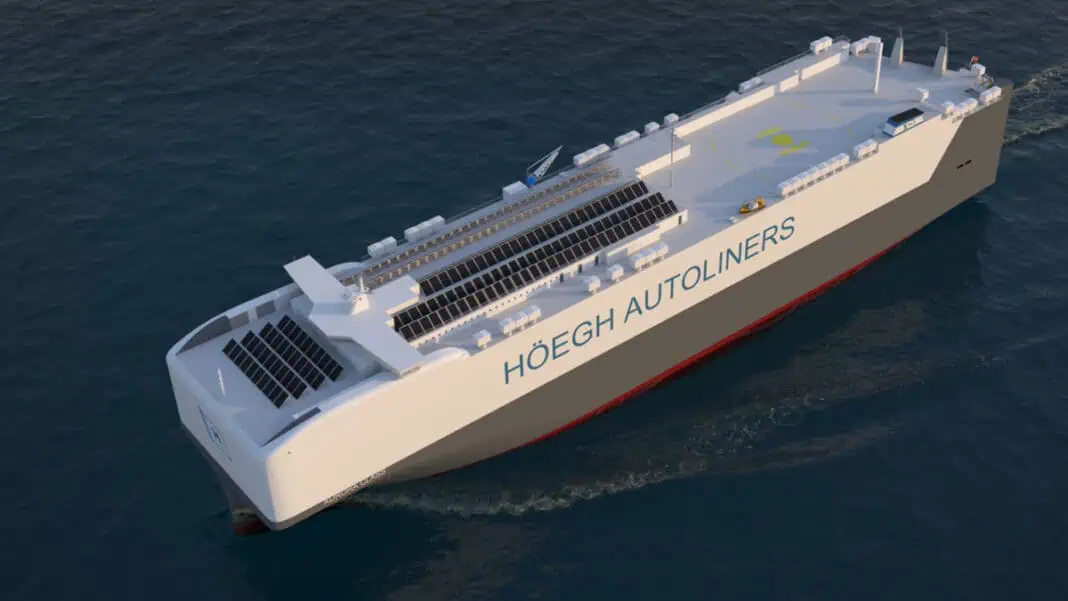Höegh Autoliners was granted NOK 109,4million in increased Enova funding as part of its “Ammonia fuelled vessel programme” to ensure that four of Höegh Autoliners’ Aurora Class vessels can run fully on ammonia when they are delivered in 2027. The company will in total receive NOK 255,4 million in Enova funding.
The funding is part of the largest ever Enova funding round supporting the green maritime transition. The purpose of the funding is to establish the first functioning value chains for ammonia and hydrogen for maritime purposes.
“At Höegh Autoliners, we take leadership by actively collaborating with a wide range of highly qualified and dedicated suppliers to make clean ammonia viable as a zero-emission shipping fuel. We believe it is important for shipping companies to send a clear signal to the rest of the value chain that the technology can be realized in a short time and that there will be demand for carbon-neutral fuel. Almost all Höegh Autoliners vessels sail under the Norwegian flag and have significant Norwegian content from the Norwegian cluster. The support from Enova, together with our innovative multi-fuel vessel design, significantly helps derisking the choice of bringing the first zero-carbon vessels to our industry,” says CEO of Höegh Autoliners, Andreas Enger.
Höegh Autoliners has a total of 12 Aurora Class vessels on order. The vessels transport rolling cargo such as cars, agricultural machinery, and mining equipment, as well as general solo cargo needing to be shipped.
The first 8 Aurora Class vessels will run on LNG, with the first one being delivered in August. These vessels are designed to be converted to run on ammonia. The ammonia engine technology will be ready in 2026, allowing us to build the last 4 vessels to run on ammonia from the start. These vessels will be delivered in 2027 and will be groundbreaking, becoming the world’s first emission-free vessels in our segment.
In March this year, Höegh Autoliners was granted NOK 146 million in Enova funding for two Aurora Class vessels to reduce the additional cost of this solution compared to a vessel that would be “ammonia ready”.
The Aurora Class vessels will significantly contribute to the company’s goal of achieving net zero emissions by 2040. Höegh Autoliners, as one of the first and few shipping companies globally, has secured access to the first ammonia 2-stroke engines delivered by MAN.
“With this support, Norway as a maritime nation, is sending a strong sustainability message. This is important for the whole Norwegian maritime cluster and for our continuous efforts to lead the way to more sustainable deep-sea transportation and a greener maritime sector. It is visionary and a key component in the green maritime transition becoming a reality. Höegh Autoliners is grateful for Enova’s support, which we view as a strong endorsement of our newbuild project. We aim at a net zero emissions future by 2040 and our Aurora Class vessels, the largest and most environmentally friendly PCTC vessels ever built, will be the first zero-carbon vessels in our industry able to run on ammonia by 2027. To get to net zero, we must make clean ammonia, perfect for long-distance transportation with our two-stroke engines, viable as the future shipping fuel, and send a clear signal to the rest of the value chain that the technology can be developed and implemented in a short time. Public-private collaboration is crucial for advancing the maritime green transition, particularly in implementing mechanisms to lower the cost of sustainable fuels until they reach parity with fossil fuels in the years to come” says COO of Höegh Autoliners, Sebjørn Dahl.
Höegh Autoliners is one of 7 companies granted the Enova funding, that will support both hydrogen vessels and ammonia vessels.
Today, shipping accounts for roughly 3% of global greenhouse gas emissions. 90% of that comes from deep-sea shipping.
The Enova funding will raise the demand for zero-emission fuels and thereby help establishing a well-functioning first market for zero-emission transport at sea creating a green tipping point for the maritime sector.
“The competition was fierce, and there were many good projects that unfortunately did not quite make it. It bodes very well for the further investment and the next round of applications. With this and the other pioneering projects that are now being awarded, Norway is leading the way, and we see that the maritime industry is at a tipping point where the transition can accelerate from here,” says CEO of Enova, Nils Kristian Nakstad.












